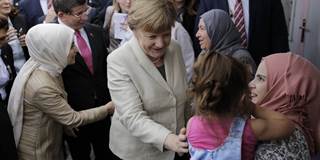 STR:AFP:Getty Images
STR:AFP:Getty Images
默克尔的新德国
柏林—德国总理默克尔的基督教民主联盟(CDU)在9月的联邦选举中赢得了多数,但这并不意味着德国的未来已经水落石出。默克尔需求与绿党和自由民主党结成新的执政联盟,结果如何不但将影响德国在未来四年的经济轨迹,还将决定德国向真正开放社会的转型的命运。
不出一代人,曾经的欧洲病夫德国就一跃成为全球经济强国。但事实上,德国当前的经济成功与其说是好政策的结果,不如说是拜(特别是欧洲的)有利的外部环境所赐,外部环境保证了德国出口的强劲需求。
平心而论,德国通过重要的国内经济改革才能够抓住外部需求。但这些改革在默克尔掌权之前早已开始,而在默克尔12年的执政生涯中,她基本上没有实施什么有意义的经济改革。比如,国内私人投资一直疲软,部分是因为服务业过度监管和沉重的官僚主义负担。
https://prosyn.org/gNc4erFzh
To continue reading, register now. It’s free!
Register Now
Already have an account?
Log in


柏林—德国总理默克尔的基督教民主联盟(CDU)在9月的联邦选举中赢得了多数,但这并不意味着德国的未来已经水落石出。默克尔需求与绿党和自由民主党结成新的执政联盟,结果如何不但将影响德国在未来四年的经济轨迹,还将决定德国向真正开放社会的转型的命运。
不出一代人,曾经的欧洲病夫德国就一跃成为全球经济强国。但事实上,德国当前的经济成功与其说是好政策的结果,不如说是拜(特别是欧洲的)有利的外部环境所赐,外部环境保证了德国出口的强劲需求。
平心而论,德国通过重要的国内经济改革才能够抓住外部需求。但这些改革在默克尔掌权之前早已开始,而在默克尔12年的执政生涯中,她基本上没有实施什么有意义的经济改革。比如,国内私人投资一直疲软,部分是因为服务业过度监管和沉重的官僚主义负担。